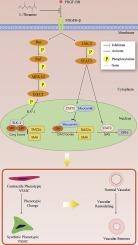The Journal of Nutritional Biochemistry ( IF 5.6 ) Pub Date : 2020-04-08 , DOI: 10.1016/j.jnutbio.2020.108398 Aijing Bi 1 , Qiyun Hang 1 , Youfang Huang 1 , Shuangning Zheng 1 , Xiaowen Bi 2 , Zhengping Zhang 3 , Zhimin Yin 2 , Lan Luo 1

|
Neointimal hyperplasia is a prominent pathological phenomenon in the process of stent restenosis. Abnormal proliferation and migration of vascular smooth muscle cells (VSMCs) play major pathological processes involved in the development of restenosis. l-Theanine, one of the major amino acid components in green tea, has been reported to improve vascular function. Here we display the effects of l-theanine on neointima formation and the underlying mechanism. In the rat carotid-artery balloon-injury model, l-theanine greatly inhibited neointima formation and prevented VSMCs from a contractile phenotype switching to a synthetic phenotype. In vitro study showed that l-theanine significantly inhibited PDGF-BB-induced VSMC proliferation and migration, which was comparable with the effect of l-theanine on AngII-induced VSMC proliferation and migration. Western blot analysis demonstrated that l-theanine suppressed PDGF-BB and AngII-induced reduction of SMA and SM22α and increment of OPN, suggesting that l-theanine inhibited the transformation of VSMCs from contractile to the synthetic phenotype. Further experiments showed that l-theanine exhibits potential preventive effects on neointimal hyperplasia and related vascular remodeling via inhibition of phosphorylation of Elk-1 and activation of MAPK1. The present study provides the new experimental evidence that l-theanine has potential clinical application as an anti-restenosis agent for the prevention of restenosis.
中文翻译:

l-茶氨酸通过抑制血管平滑肌细胞表型调节来减轻新内膜增生。
新内膜增生是支架再狭窄过程中的突出病理现象。血管平滑肌细胞(VSMC)的异常增殖和迁移是参与再狭窄发展的主要病理过程。升-Theanine,绿茶中的主要氨基酸成分之一,已上报改善血管功能。在这里,我们展示了l-茶氨酸对新内膜形成及其潜在机制的影响。在大鼠颈动脉球囊损伤模型中,l-茶氨酸极大地抑制了新内膜的形成,并阻止了VSMC从收缩型转变为合成型。体外研究表明,升-茶氨酸显着抑制PDGF-BB诱导的VSMC增殖和迁移,这与1-茶氨酸对AngII诱导的VSMC增殖和迁移的作用相当。Western印迹分析表明,1-茶氨酸抑制PDGF-BB和AngII诱导的SMA和SM22α的减少以及OPN的增加,表明1-茶氨酸抑制了VSMC从收缩型向合成表型的转化。进一步的实验表明,1-茶氨酸通过抑制Elk-1的磷酸化和激活MAPK1对新内膜增生和相关的血管重构具有潜在的预防作用。本研究提供了新的实验证据表明,升-茶氨酸作为预防再狭窄的抗再狭窄剂具有潜在的临床应用。



























 京公网安备 11010802027423号
京公网安备 11010802027423号